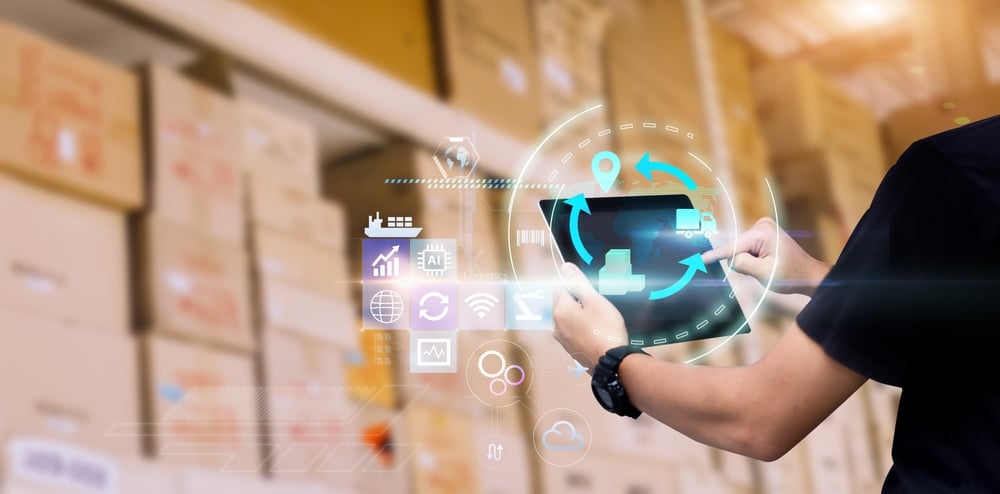Can Technology Drive Better FTL Truck Shipping? Yes - Here’s Why
If you're part of the logistics industry, you're likely well aware of the critical role that Full Truck Load (FTL) shipping plays in over-the-road logistics. It involves transporting large amounts of a homogenous product, usually packed in a single truck shipment. But did you know that the face of FTL truck shipping is rapidly changing, thanks to technology?
That's right! Modern digital solutions are sweeping through FTL operations, streamlining processes, and driving significant improvements. This blog post focuses on technology's dynamic role in transforming FTL truck shipping - making processes faster, more efficient, and ultimately, more profitable.
We'll also spotlight Cargobot, an industry-leading solution that is changing the game in the world of FTL logistics. So, get ready to dive deep into the digital revolution of FTL truck shipping.
The Current Landscape of FTL Truck Shipping

Full truckload (FTL) shipping plays a significant, if often unseen, role in sustaining our daily lives. As the backbone of over-the-road logistics, FTL shippers are responsible for transporting various goods, from essential food and medicines to consumer electronics and household furniture.
These freight shipping operators not only deliver these goods across states and countries, they often do so under immense time pressure and tight schedules.
Despite its critical role, the traditional FTL trucking industry is far from perfect. Inefficiencies in planning and executing routes can lead to unnecessary fuel consumption and prolonged delivery times. Load optimization, the process of strategically arranging goods to maximize the cargo space and minimize fuel costs, also poses a significant challenge.
It can be a daunting task even for seasoned shippers, especially when dealing with diverse goods of varying shapes, sizes, and weights. Additionally, communication breakdowns between drivers, dispatchers, freight brokers, and customers can cause frustrating delays and mishaps. Shippers might also be unable to provide accurate delivery updates without proper tracking tools, affecting customer satisfaction and trust.
As the above points illustrate, it’s clear that traditional FTL operations face some stiff challenges. But where problems arise, so do opportunities. The next section will examine technology's role in revolutionizing FTL truck delivery.
Role of Technology in FTL Truck Shipping

You might wonder just how technology, specifically digital platforms like Cargobot, can revolutionize operations in the FTL truck shipping industry. The answer lies in their capability to address prevailing challenges in route planning, load optimization, and communication.
Digital platforms incorporate sophisticated technologies such as real-time tracking, automated route planning, and AI-powered load optimization. These technologies aim to resolve apparent issues and pave the way for improvements that redefine the shipping industry standard.
Real-time tracking, for instance, allows shippers to keep tabs on their shipments, thus reducing uncertainty and enhancing their ability to manage their operations. This technology constantly updates the truck's location, offering much-needed visibility and control in transit operations.
The Power of Automated Route Planning
Moving on, automated route planning optimizes transit schedules and routes using data-driven predictions and analytics. This makes it easier for truck drivers to avoid congestion, weather disturbances, and other potential delays. More importantly, it makes transport quicker and more efficient.
AI-powered load optimization, on the other hand, can drastically cut down on wasted space in the truck. It does so by analyzing the size, shape, and type of freight and then producing a loading plan that maximizes the usage of available space. This ability to use space efficiently can lead to significant fuel and cost savings.
As we can see, technology is not just a band-aid solution to glaring issues in FTL truck shipping. Its innovations and advancements have the potential to redefine and uplift the industry standard. It's not simply a question of whether technology "can" improve FTL truck operations, but rather how long it will be until these digital advancements become the norm.
Benefits of Integrating Technology in FTL Truck Operations

When deployed appropriately, tech upgrades can potentially supercharge FTL truck operations in diverse ways. From fuel efficiency to time savings, the perks are hard to ignore. Let's take a more in-depth look at some of these key benefits:
Speed Improvements
Imagine being able to plan your routes in an instant and execute them flawlessly. With automated route planning tools, this is no longer just a hypothetical scenario. Detailed road maps coupled with real-time data can spot traffic bottlenecks, road constrictions, and detours, allowing for more efficient route planning.
The gain from this? Fewer delays, allowing for faster delivery times. Real-time data, another prodigy of technology, comes in handy here, providing insights not just about where a truck is, but also about factors that could impact its journey. Speed improvements can be a real game-changer for FTL operators by reducing downtimes and boosting turnaround times.
Cost Efficiency
Costs can often be the breaking point in logistics, but with technology, they don't have to be. Better load optimization through AI tools can reduce wasted space and fuel costs. More is being shipped more effectively, which means fewer trucks on the road, saving money and reducing environmental impact.
And what about human errors? They can lead to costly mistakes. Tech-infused systems decrease these risks by automating processes. This can result in lower labor costs and fewer errors, creating a smarter, more economical FTL shipping operation.
Integrating technology into FTL truck operations can be hugely beneficial. Focusing on speed improvements and cost efficiency shows tangible, direct returns and underlines the hidden advantages: increased customer satisfaction, inter-team communication, and a future-proofed business.
As daunting as embracing technology may seem, the advantages are undeniable. Therefore, it's time to consider integrating technological solutions like Cargobot into your operations and watch your FTL business transform for the better.
The Future of FTL Truck Shipping with Technology

Technology is poised to continue to revolutionize the FTL truck shipping industry. As shippers increasingly adopt digital solutions like Cargobot, the sector will likely undergo profound transformations in the coming years.
The Role of Blockchain Advancements
One such change could come in the form of blockchain technology. Widely known as the technology behind cryptocurrencies like Bitcoin, blockchain can provide a secure, immutable ledger that could greatly simplify shipment tracking. The technology could virtually eliminate the risk of lost or mistaken shipment, enhancing the integrity of FTL operations.
How Artificial Intelligence Will Play a Role
Beyond blockchain, we will likely see more sophisticated use of artificial intelligence (AI) in FTL shipping. AI is already being used to optimize load arrangements and route planning. However, we could soon see AI being leveraged for predictive maintenance, determining when parts might fail before they do so. This could have a profound impact, enhancing operational efficiency and reducing downtime.
The Future With Autonomous Vehicles
Additionally, autonomous vehicles are another exciting prospect for the future of FTL truck shipping. While it's still in the early days, developments in this area could lead to substantial cost and time savings, not to mention improved safety outcomes.
Internet of Things (IoT) technologies are also expected to have a significant impact. With IoT sensors, FTL truck shippers might be able to manage their fleet's condition better, track shipments in real time, and enhance the overall efficiency of their operations.
These are just glimpses of what the future could hold. It's a thrilling time to be involved in FTL truck shipping. New technologies, like Cargobot, have already begun to reshape the landscape, but the most exciting transformations may still be yet to come.
Introducing Cargobot: The Game Changer in FTL Shipping
.png?width=1500&height=844&name=HERO%20TRUCK%202%20(LOGO2).png)
Within digital freight management platforms, Cargobot stands out as a distinctive game-changer. A homebred solution for many challenges FTL shippers face, Cargobot's innovative approach ushers in a new era of efficiency and efficacy in over-the-road logistics.
The platform offers an array of tools, including real-time tracking, which provides an accurate, up-to-the-minute, GPS-enabled location status of your shipment. This level of visibility is unprecedented in traditional FTL operations and empowers shippers to have better oversight and control over their cargo, leading to improved decision-making and planning.
An Overview of Technology-Driven Benefits
Next we have automated route planning. Remember the challenge of inefficient routes we discussed? Well, not anymore. Cargobot, through its intelligent routing algorithms, calculates the most efficient path for the truck shipment. It considers numerous factors such as traffic, weather conditions, and road work, eliminating any guesswork and enabling faster delivery times.
Artificial Intelligence (AI) comes into play in load optimization. Cargobot's AI learns from millions of data points, providing insights on how to pack the cargo efficiently. This ensures maximum capacity utilization while reducing fuel costs and the potential for cargo damage.
Two Services for Different Sectors: Cargobot Direct and Cargobot Pool
But the innovation does not stop there. The recent release of Cargobot Direct and Cargobot Pool bodes well for shippers and carriers alike. Cargobot Direct focuses on the direct shipper-to-carrier relationship, eliminating the need for a middleman and making the process more transparent and cost-effective.
On the other hand, Cargobot Pool is a co-loading service that fosters better space utilization of trucks, which is particularly beneficial for shippers with less-than-truckload (LTL) shipping needs.
No doubt, adopting a platform like Cargobot can significantly streamline your FTL operations, but more importantly, it positions you to be ready for the future - A future where technology and logistics continue to intertwine ever so tightly to deliver better value for shippers, carriers, and ultimately, customers.
Don't Wait - Get Your Quote and Start Now
Eager to get a taste of the future today? Your path to transformative logistics operations begins with a simple step - reaching out to Cargobot. They're not just there to sell a product but to partner with you, offering bespoke solutions tailored to your unique FTL shipping needs. Don't put off optimizing your operations when progress is only a click away.
Contact Cargobot now and revolutionize your FTL shipping landscape today. Who knows? Your best quote ever could be just one conversation away.

